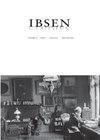Et Dukkehjem in Arabic Translation
IF 0.1
0 THEATER
引用次数: 4
Abstract
As has often been noted, authors of original works make “national” literature, while translations (and translators) make “world” literature. Ibsen’s plays were translated from Norwegian into English, German, French, Russian, and other European languages, and only from these relay translations into languages of the world beyond. And it was in such a “world literature” framework the plays were translated into Arabic, in series such as “Masterpieces of World Drama”, “World Theatre”, and “Library of world dramatic work”. In this article, I will discuss some translations of Et Dukkehjem (A Doll’s House) into Arabic. To begin with, I shall provide a short literary, cultural/political and linguistic background for framing these translations in the Arabic literary “polysystem”. Next, I will discuss some challenges encountered when trying to map Arabic Ibsen translations and their sources, before I present “my” translations of A Doll’s House and make some textual comparisons with a focus on certain key linguistic and cultural items.阿拉伯语翻译中的杜克霍姆
正如人们经常注意到的那样,原创作品的作者创造了“国家”文学,而翻译(和译者)则创造了“世界”文学。易卜生的戏剧被从挪威语翻译成英语、德语、法语、俄语和其他欧洲语言,只有从这些语言中才被翻译成世界其他语言。正是在这样一个“世界文学”的框架下,这些戏剧被翻译成阿拉伯语,形成了“世界戏剧杰作”、“世界戏剧”和“世界戏剧作品库”等系列。在这篇文章中,我将讨论Et Dukkehjem(玩偶之家)到阿拉伯语的一些翻译。首先,我将提供一个简短的文学、文化/政治和语言背景,以在阿拉伯语文学“多元系统”中构建这些翻译。接下来,我将讨论在绘制阿拉伯语易卜生译本及其来源时遇到的一些挑战,然后我将介绍《玩偶之家》的“我的”译本,并重点对某些关键的语言和文化项目进行文本比较。
本文章由计算机程序翻译,如有差异,请以英文原文为准。
求助全文
约1分钟内获得全文
求助全文

 求助内容:
求助内容: 应助结果提醒方式:
应助结果提醒方式:


